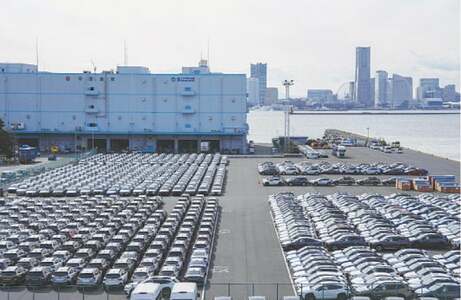EXPORTERS in Pakistan are not worried about the US tariffs affecting half the world. Instead, some of them believe it may create bigger opportunities for them.
Trade surplus with the US is now a curse for countries which have been enjoying the bonanza for decades and Pakistan is among them. However, Pakistani exporters said they were not worried since the size of business with the US is too small to attract the attention of policymakers in Washington.
It is surprising that neither the government nor exporters are prepared for an eventuality in which the US asks Pakistan to buy more of its products in order to eliminate trade surplus.
Islamabad should not forget that Washington did not return the money Pakistan paid for F-16 fighters during the 1990s. Instead the US asked Pakistan to increase its imports.
The dispute stemmed from Washington’s non-delivery of 28 F-16 fighters, for which Islamabad paid $658 million in 1989. The US agreed to pay Pakistan $326.9m and provided goods worth another $140m, including wheat worth $60m. But Pakistan did not need wheat at that time. It shows the US can do anything against any country like Pakistan.
On March 27, the US added 80 entities to a trade blacklist. Besides Pakistan, the action affects entities from China, Taiwan, the United Arab Emirates, Iran and South Africa, with the department citing their “activities are contrary to US national security and foreign policy”.
The US Department of Commerce’s Bureau of Industry and Security (BIS) added Pakistani firms to its export control list, accusing them of involvement in Pakistan’s ballistic missile and nuclear programmes.
The latest US move should be considered as a beginning that may lead the anti-Pakistan lobby in Washington to ask Islamabad to do more. Even though Pakistan’s exports are not significant for the US, it is vital for the former as any sanctions on export of goods and services could cut off this country’s exports to Europe as well.
Out of $30bn annual exports, our total exports to the EU and US amount to $16bn.
Pakistan’s exports to the US totalled $5.5bn in FY24 while imports were about $1.8bn — a surplus of $3.7bn.
Exporters said meetings on the issue of possible US tariffs on Pakistani exports were held neither by the government nor by exporters themselves.
Former finance minister Miftah Ismail said our exports are too small to bother the United States. He did not see any possibility of tariffs on exports.
The US did not spare its long-time tested allies and neighbours to pursue a policy of balance of trade and to eradicate the trade surplus.
While China topped the list of countries subjected to stiff tariffs, the US treatment of Canada and Mexico was no different.
The countries were partners in NAFTA (North American Free Trade Agreement), which was replaced with the United States-Mexico-Canada Agreement (USMCA) from July 1, 2020. It will end in 2036.
The situation was even worse when the US asked EU countries to end the trade surplus and pay for defence expenses being borne by the North Atlantic Treaty Organisation (NATO), led by Washington. This was shocking for EU countries and a few countries, France among them, reacted against the US move.
According to exporters, there was no observation about the changing US trade policy that has already changed the economic world.
“I don’t think the US needs to impose tariffs on Pakistani exports. Our exports are too little to harm an economy like the US,” said Javed Bilwani, a known business leader and exporter.
Instead, he added, if the US spares Pakistan, there would be a bigger opportunity for us to increase our exports.
Since China is facing the biggest tariffs on imports, the prices of Chinese products would be much higher in the US market which would create space for cheaper products from countries like Pakistan.
There is little awareness about the changing economic world after the change of guard in Washington in January. American policies are changing the economic world faster than ever, but more important is that the US has now adopted a protectionist policy based on its might of weapons and a single world currency dollar.
The question is: will this US “War of Tariffs” spare Pakistan while the country is not in the good books of the US despite toeing the US policy in the region.
The gravity of the situation has been felt deeply by the countries already facing the tariffs, but the policy makers and exporters have unilaterally kept Pakistan out of this fast changing economic world.
Frequent executive orders
US President Donald Trump’s frequent executive orders began with tariffs on imports and have reached visa restrictions on many countries. Pakistan has also been put in the third category of the list with the reported time span of 60 days to remove deficiencies.
The Foreign Office denies any restrictions on visas for Pakistanis, but the recent incident in which a Pakistani diplomat was stopped from entering the US, reflects changing policies towards Pakistan.
This country’s largest trade partner is China, but Beijing is doing a trade surplus of $10.8bn with Pakistan.
Exporters and the policymakers both should search for more space for exports to China before it is too late.
Imports from China have been increasing fast — $13.5bn in FY24 from $9.7bn in FY23 — an increase of $3.8bn or 39 per cent.
During July-Feb FY25, imports reached $10.2bn, compared to $8.1bn in the same period of last year — showing an increase of 26 per cent.
As about 25 percent of imports come from China, there is room for growth in exports and an opportunity for Pakistan to adjust exports before facing any untoward US policy.
Published in Dawn, March 30th, 2025
















































